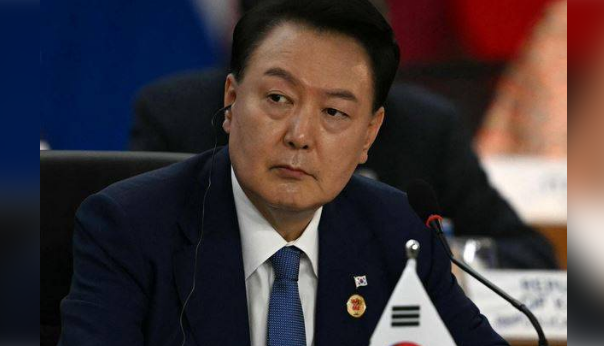Seoul (Web Desk /Agencies): The South Korean National Assembly made a decisive move on Saturday, taking the unprecedented step of suspending President Yoon Suk Yeol from his duties following his recent attempt to impose martial law.
The impeachment motion, which gained traction after several members of Yoon’s own People Power Party (PPP) broke ranks and joined the opposition, succeeded with 204 votes in favor, surpassing the critical two-thirds majority required.
This result signals a deepening divide within the political establishment and marks a rare moment of significant institutional pushback against a sitting president.
Yoon’s attempt to impose martial law, a highly contentious and aggressive decision, quickly spiraled out of control.
His announcement on December 4, which sought to curtail political opposition by deploying military forces to the heart of government, was met with immediate resistance both within the parliament and from the public.
Tensions reached a peak when South Korean troops were seen attempting to enter the parliament building, leading to chaotic scenes, including aides using fire extinguishers to prevent their advance.
Yoon’s martial law was swiftly rejected by the legislative body, which voted overwhelmingly to rescind the decree, forcing him to back down within hours.
Despite his suspension, Yoon retains the formal title of president, although the constitution stipulates that his powers are now effectively in abeyance. In his stead, Prime Minister Han Duck-soo, a close Yoon ally, has assumed the role of acting president.
The constitution mandates that the Constitutional Court will rule on the validity of the impeachment within the next six months, with the possibility of a snap election being triggered if Yoon is removed from office.
This marks the second time in a decade that South Korea has seen a conservative president impeached, the first being Park Geun-hye’s ouster in 2017.
The political atmosphere in the country is charged, with public sentiment largely reflecting discontent with Yoon’s authoritarian approach and the growing perception of executive overreach.
In the aftermath of the impeachment vote, Prime Minister Han expressed his dismay, promising to maintain stability in government but acknowledging the gravity of the situation.
Yoon, for his part, has vowed to contest the impeachment and rejected calls for his resignation, framing the move against him as the work of “anti-state” factions.
His combative stance comes amid a criminal investigation into his actions surrounding the martial law decree, with authorities restricting his movements by placing a travel ban on him.
As the nation watches, the fate of President Yoon hangs in the balance. The unfolding political drama will not only define his presidency but also set the stage for the future direction of South Korean democracy, testing the resilience of its institutions and the will of its people.


